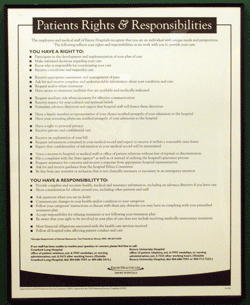![]()
日本人がみたアメリカ その3
「自己責任」
さて,今日はちょっとまじめなお話です.
以前(まえ)に流行りましたね,この言葉.
少々胡散臭い言葉のように感じます.
「責任」というだけで十分に意味がわかるのに,それにさらに強調の「自己」がついていますよね.
日本語はいろんな意味で感覚的な言語です.
その分,いろんな言葉,外来語,造語などあって楽しいのですが,ときどき怪しい言葉もあります.
そんなときにのび太は,「このことば,英語に訳したらなんていうかな?」って考えたりします.
それでは,「自己責任」,英語ではなんていうでしょうね?
One’s own responsibility
でしょうか.
ちなみに,「責任をとる」はtake (all) the responsibilityです.
一方「お前の責任だぞ!」というと英語では「This is your fault!」です.
Faultは過ちという意味ですよね.
この「お前の責任だぞ」なんてあたりが自己責任という単語と意味合いが重なっているのではないでしょうか.
さて,今回のタイトルは「自己責任」ですが,実は医療ネタです.
医療における「自己責任」というと,真っ先に思い浮かぶのは「インフォームドコンセント」ですよね.
日本語では「説明された同意」といいます.
これは,私たち医療サービスを提供する側にとっても,患者様にとっても,
大変大事なことです.
最近はみなさんよく勉強なさっているので,
患者様との日常診療で首をかしげるような機会はなくなりました.
ただ,マスメディアによる医療報道では,
まだまだおかしなところがいっぱいあるように感じます.
「説明された同意」という言葉には「された」という受動態(受け身)の言葉が含まれています.
患者様が病状や治療方針などご自分の状態に関して十分な説明を受けたという受動態です.
ただし,この言葉には本当はもうひとつ能動態が含まれているのです.
「同意」,患者様が同意するという能動態です.
つまり,
十分な説明のうえで治療法を選択するのは患者様ご本人ですよ,
ご自分でわからないところは遠慮なく質問して下さいね,
そのうえでよく考えて下さいね,
ご自分の健康のことだから最終的にはご自分で決めて下さいね,
という同意です.
日常診療では,これがなんてことなくスムースにいっていると感じますが,
医療時事問題に関するメディアの報道には,
患者様ご自身が責任持って質問,熟慮,決定する,という視点が欠けているように感じます.
さてこういったインフォームドコンセントという概念確立の社会的背景には
「プライバシーの概念」の変遷があります .
かつてはプライバシーとは「一人にしておいてもらう権利(the right to be left alone)」でした.
その後アメリカを中心として,プライバシーの概念に
「自己決定権(autonomy:ひとりにしておいてもらうだけではなく,
自分に関すること(特に情報)を自分でコントロールするという能動的な権利)」が加わりました.
医学の分野も例外でなく,医学的な倫理基準として,患者自身による医療行為の決定権の尊重,
そして,そのための徹底的なインフォームドコンセントが設定されました.
メディアの方々はこのような背景をご存じなく報道されているのかもしれません.
さて,のび太がアメリカで勤務していたエモリー大学医学部には大学病院が3つほどありました.
そのうち医学部に隣接していたエモリー大学病院本院には,
「患者様の権利と責任」というモットーが額に入れられて飾られていました.
エレベーターホール,階段の踊り場などいたるところに掛けられていて,
患者様とご家族のみなさんの眼にとまって読んでもらえるようになっていました.
なかなかいいことが書いてあるのでここではそれを転載したいと思います.
英語にちょっぴしでも自信のあるかたは原文をお読み下さい.
日本語版は,のび太が訳したものです.
原文の言語感覚を尊重するために直訳,逐語訳してあります.
日本語としては硬く読みづらい文章と思いますがご了承ください.
読んでもらえればわかりますが,
適切は治療を受けるためには患者様自身の権利と同様にその責任も伴う,
ということが明示されています.
そう,当たり前のことですが権利と責任は表裏一体なんですね.
現在の日本は,かつてとは異なり多様な価値観のあふれた社会になっています.
これからはこういった「言うまでもなくあたりまえのこと」を
きちんと明文化し明示する必要があるかもしれませんね.
注:各病院関係者,医療従事者のみなさまへ.
以下の患者様の権利と責任,という文章が気に入られたら,
どうぞ,あなたの周りで使って下さってけっこうです.
できれば,エモリー大学病院そして,のび太のホームページよりの引用である,
と出典先を明示してくださるととっても嬉しいです.

PATIENTS RIGHT & RESPONSIBILITIES The employees and medical staff of Emory Hospitals recognize
that you are an individual with unique needs and perspectives. YOU HAVE A RIGHT TO: Participate in the development and implementation of your plan
of care Receive appropriate assessment and management of pain Request auxiliary aids when necessary for effective communication Have a family member or representative of your choice notified
promptly of your admission to the hospital Have a right to personal privacy Voice concerns to hospital or medical staff or office of patient
relations without fear of reprisal or discrimination YOU HAVE A RESPONSIBILITY TO: Provide complete and accurate health, medical and insurance information,
including an advance directive if you have one Ask questions when you are in doubt Meet financial obligations associated with the health care services
received |

患者様の権利と責任 エモリー大学の職員および医療スタッフは患者様(以下「あなた」)が個々特有のニーズと展望を持った一個人であると認識しています. あなたは以下に記する権利を有しています: あなたの医療計画を発展させ実行することに参加する権利 疼痛に関して適切な評価を受け疼痛管理を受ける権利 有効なコミュニケーションが必要とされる時に一時的な助けを要求する権利 あなたの入院を,家族またはあなたが選んだ代理人に即座に通知される権利 プライバシーを持つ権利 あなたの医療費の詳細を説明される権利 報復や差別の恐れなしに,病院,医療スタッフ等に対する(心配事)意見を表明する権利 あなたは以下に記する責任を有しています: 健康,医療,保険に関するすべての正確な情報を提供する責任,もしあなたが前もっての指針を与えられている場合にはこれも含む あたなが疑いを持っている時に質問する責任 あなたの医療保険に関する債務を果たす責任 |

2006.03
